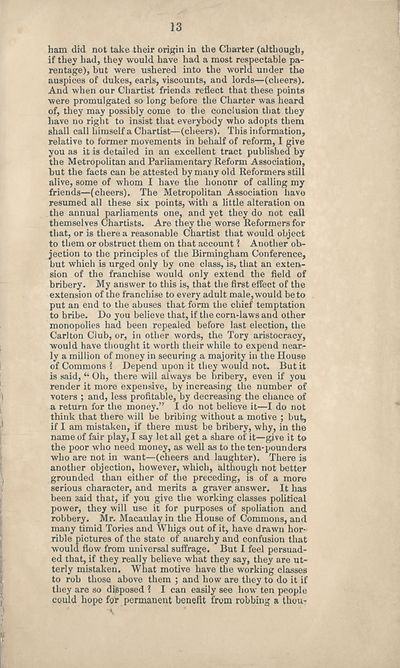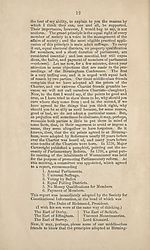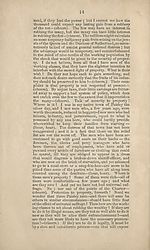Download files
Complete book:
Individual page:
Thumbnail gallery: Grid view | List view

13
ham did not take their origin in the Charter (although,
if they had, they would have had a most respectable pa¬
rentage), but were ushered into the world under the
auspices of dukes, earls, viscounts, and lords—(cheers).
And when our Chartist friends reflect that these points
were promulgated so long before the Charter was heard
of, they may possibly come to the conclusion that they
have no right to insist that everybody who adopts them
shall call himself a Chartist—(cheers). This information,
relative to former movements in behalf of reform, I give
you as it is detailed in an excellent tract published by
the Metropolitan and Parliamentary Reform Association,
but the facts can be attested by many old Reformers still
alive, some of whom I have the hononr of calling my
friends—(cheers). The Metropolitan Association have
resumed all these six points, with a little alteration on
the annual parliaments one, and yet they do not call
themselves Chartists. Are they the worse Reformers for
that, or is there a reasonable Chartist that would object
to them or obstruct them on that account 2 Another ob¬
jection to the principles of the Birmingham Conference,
but which is urged ordy by one class, is, that an exten¬
sion of the franchise would only extend the field of
bribery. My answer to this is, that the first effect of the
extension of the franchise to every adult male, would be to
put an end to the abuses that form the chief temptation
to bribe. Do you believe that, if the corn-laws and other
monopolies had been repealed before last election, the
Carlton Club, or, in other words, the Tory aristocracy,
would have thought it worth their while to expend near¬
ly a million of money in securing a majority in the House
of Commons 2 Depend upon it they would not. But it
is said, “ Oh, there will always be bribery, even if you
render it more expensive, by increasing the number of
voters ; and, less profitable, by decreasing the chance of
a return for the money.” I do not believe it—I do not
think that there will be bribing without a motive ; but,
if I am mistaken, if there must be bribery, why, in the
name of fair play, I say let all get a share of it—give it to
the poor who need money, as well as to the ten-pounders
who are not in want—(cheers and laughter). There is
another objection, however, which, although not better
grounded than either of the preceding, is of a more
serious character, and merits a graver answer. It has
been said that, if you give the working classes political
power, they will use it for purposes of spoliation and
robbery. Mr. Macaulay in the House of Commons, and
many timid Tories and Whigs out of it, have drawn hor¬
rible pictures of the state of anarchy and confusion that
would flow from universal suffrage. But I feel persuad¬
ed that, if they really believe what they say, they are ut¬
terly mistaken. What motive have the working classes
to rob those above them ; and how are they to do it if
they are so disposed 2 I can easily see how ten people
could hope fof permanent benefit from robbing a thou-
ham did not take their origin in the Charter (although,
if they had, they would have had a most respectable pa¬
rentage), but were ushered into the world under the
auspices of dukes, earls, viscounts, and lords—(cheers).
And when our Chartist friends reflect that these points
were promulgated so long before the Charter was heard
of, they may possibly come to the conclusion that they
have no right to insist that everybody who adopts them
shall call himself a Chartist—(cheers). This information,
relative to former movements in behalf of reform, I give
you as it is detailed in an excellent tract published by
the Metropolitan and Parliamentary Reform Association,
but the facts can be attested by many old Reformers still
alive, some of whom I have the hononr of calling my
friends—(cheers). The Metropolitan Association have
resumed all these six points, with a little alteration on
the annual parliaments one, and yet they do not call
themselves Chartists. Are they the worse Reformers for
that, or is there a reasonable Chartist that would object
to them or obstruct them on that account 2 Another ob¬
jection to the principles of the Birmingham Conference,
but which is urged ordy by one class, is, that an exten¬
sion of the franchise would only extend the field of
bribery. My answer to this is, that the first effect of the
extension of the franchise to every adult male, would be to
put an end to the abuses that form the chief temptation
to bribe. Do you believe that, if the corn-laws and other
monopolies had been repealed before last election, the
Carlton Club, or, in other words, the Tory aristocracy,
would have thought it worth their while to expend near¬
ly a million of money in securing a majority in the House
of Commons 2 Depend upon it they would not. But it
is said, “ Oh, there will always be bribery, even if you
render it more expensive, by increasing the number of
voters ; and, less profitable, by decreasing the chance of
a return for the money.” I do not believe it—I do not
think that there will be bribing without a motive ; but,
if I am mistaken, if there must be bribery, why, in the
name of fair play, I say let all get a share of it—give it to
the poor who need money, as well as to the ten-pounders
who are not in want—(cheers and laughter). There is
another objection, however, which, although not better
grounded than either of the preceding, is of a more
serious character, and merits a graver answer. It has
been said that, if you give the working classes political
power, they will use it for purposes of spoliation and
robbery. Mr. Macaulay in the House of Commons, and
many timid Tories and Whigs out of it, have drawn hor¬
rible pictures of the state of anarchy and confusion that
would flow from universal suffrage. But I feel persuad¬
ed that, if they really believe what they say, they are ut¬
terly mistaken. What motive have the working classes
to rob those above them ; and how are they to do it if
they are so disposed 2 I can easily see how ten people
could hope fof permanent benefit from robbing a thou-
Set display mode to:
![]() Universal Viewer |
Universal Viewer | ![]() Mirador |
Large image | Transcription
Mirador |
Large image | Transcription
| Antiquarian books of Scotland > Politics & government > Complete suffrage > (17) |
|---|
| Permanent URL | https://digital.nls.uk/125712331 |
|---|
| Description | Thousands of printed books from the Antiquarian Books of Scotland collection which dates from 1641 to the 1980s. The collection consists of 14,800 books which were published in Scotland or have a Scottish connection, e.g. through the author, printer or owner. Subjects covered include sport, education, diseases, adventure, occupations, Jacobites, politics and religion. Among the 29 languages represented are English, Gaelic, Italian, French, Russian and Swedish. |
|---|

